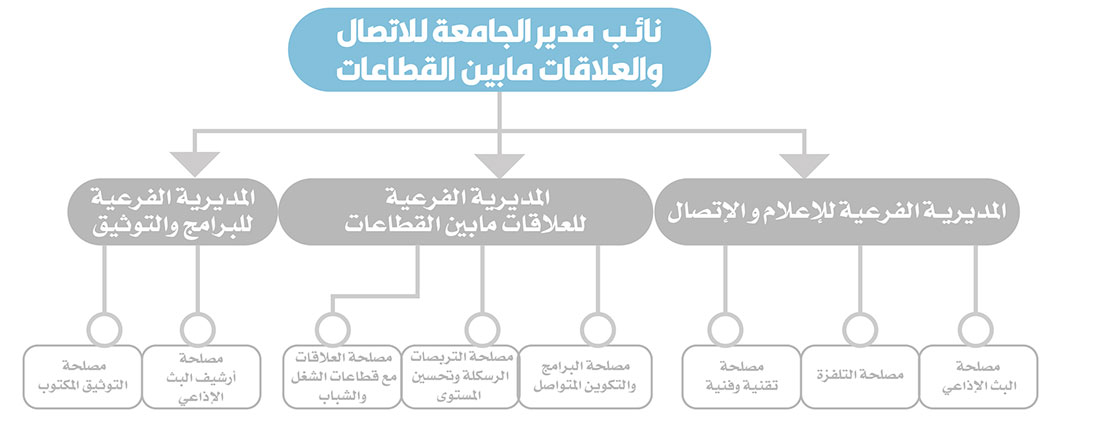
The functions of The Vice-rector of Communications and Inter-Sectoral Relations:
– Developing training programs closely aligned with the real needs of the job market
– Providing customized training for all levels of professionals and employees
– Developing continuous training in collaboration with relevant institutions and sectors.
– Organizing workshops for skills enhancement and professional development in response to the requests of relevant sectors.
– Creating a bridge of collaboration between the University and the outside world (economic and administrative institutions).
– Implementing all relevant curricula and methodologies in the field of formation.
– Empowering The trained individuals to acquire skills and capabilities in their respective fields of work.
– Improving the performance level of administrative and economic institutions.
- Functions of the Sub-Directorate for Intersectoral Relations :
The University of Continuous Training has acquired a pioneering experience in the field of continuous training in all its forms, aligning its objectives with the future vision of training in Algeria. Being present nationwide has positioned it as a distinguished partner in the field of training, enabling it to make a qualitative leap due to its decentralized structure.
– Developing Training programs closely aligned with the real needs of the labor market.
– Providing on-demand training for all levels of employees and professionals.
– Organizing training courses to enhance skills and update knowledge for the benefit of various relevant sectors.
– Creating a collaborative bridge between the University of Continuous Training and the outside world, including economic and administrative institutions.
- Patterns of training oriented towards various economic institutions :
- CustomizedTraining
It is a Training program that is carried out based on requests from social partners (administrative, economic, and service institutions) with the aim of qualifying and developing human resources in specific fields. This type of training includes:
- Training to enhance skills and update knowledge: This aims to improve the level and qualifications of employees and professionals in their respective fields. It focuses on enhancing their professional skills and capabilities through lectures delivered by specialized professors in specific areas. This can be achieved through organizing study days, seminars, or conferences targeted primarily at a specific group of participants.Among the majors, for example but not limited to, are:
- ManagementHumanResources
- Meetings Management
- Local Authorities Management
- Foreignlanguages (French, English, Italian, German)
- Auditing
- Preparation of examinations and recruitments
- Reception&Orientation
- Public Transactions
- PublicAccounting
- Administrative Communication (in Arabic and French)
- Communication
- Civil Status
- Computer Science
- The ActRelated to Financial Laws (LOLF )
- Results-BasedManagement (GAR)
- StatisticalAnalysis of Data.
- Post-GraduateSpecializedTraining
Post-graduate specialized Training: It consists of long-term specialized Training that combines theoretical aspects (lectures) and practical aspects (directed works), culminating in the preparation of a graduation thesis at the end of the training. One of the most important forms of post-graduate specialized training conducted by the Sub-Directorate for Inter-Sectoral Relations is:
- Economic Intelligence
- Management
- Industrial Management
- Finance and Accounting
- Training Engineering
- Training Programs
The University of Continuous Training organizes training programs after signing agreements with various sectors and institutions. The aim is to meet the needs of the labor market and enable participants to acquire skills and abilities. Among the prominent social partners are:
- Ministry of Justice
- Ministry of Interior
- Ministry of Higher Education in various university institutions
- Ministry of Finance
- National Assembly for Rural Engineering
- The Quality of Training
To ensure the quality of Training, the University of Continuous Training relies on the implementation of all appropriate methodologies and approaches in the field of training. It relies on highly competent professors, trainers, and specialists from various sectors.
- The Sub-Directorate for Documentation and Programming
The Sub-Directorate for Documentation is one of the directorates under the Vice-Recotorate of the University for Communication and Inter-Sectoral Relations. One of its objectives is to establish an effective methodology and approach for collecting and disseminating information and documents that meet the needs and goals of the University, in order to contribute to the development of continuous Training opportunities and the creation of television and radio programs related to its institutions.
- Functions:
- Preparation and monitoring of television programs in line with the opening direction them before broadcasting.
- Preparation and monitoring of daily radio programs before broadcasting.
- Management of the sub-directorate documentary content.
- Organizational Structure of the Sub-Directorate for Documentation:
- Audiovisual Documentation Department:
- Archiving, preservation, processing, and storage of audiovisual archives.
- Archiving of onlinelessons (reinforcementlessons).
- Written Documentation Department:
- Processing the institution’s archives, such as newsletters, newspapers, and magazines.
- Training and preparation of an information bank concerning national institutions that have benefited from training programs offered by the University of Continuous Training within the framework of agreements concluded with these institutions.
- Future Projects:
The emergence and advancement of information and communication technology have greatly contributed to the development of functions within institutions and the transformation of methods for storing and retrieving information and documents, thanks to the internet, within the framework of what is known as electronic archiving. Therefore, the Sub-Directorate for Documentation and Programming is launching several projects, including:
- Digitizing audiovisual archives (television programs).
- Digitizing audio archives (radio programs).
- Digitizing online lessons (reinforcement lessons).
- Establishing an information bank related to on-demand training.
